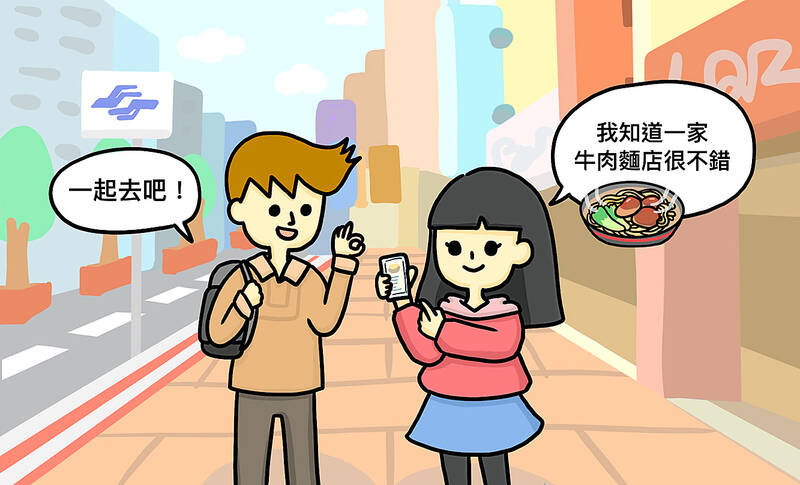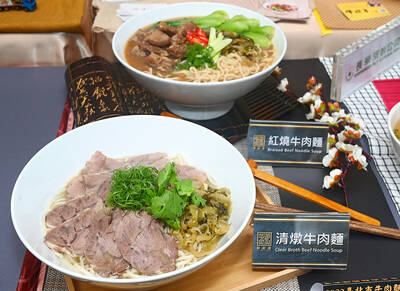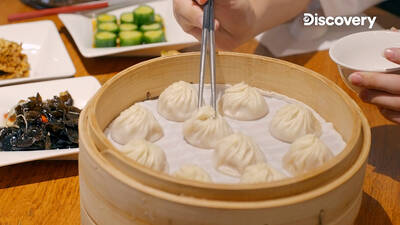對話 Dialogue
小實:我餓了,我們去吃午餐,好不好?
Xiaoshi: Wǒ è le, wǒmen qù chī wǔcān, hǎo bù hǎo?

馬克:好啊,你想吃什麼?
Make: Hǎo a, nǐ xiǎng chī shénme?
小實:我知道一家牛肉麵店很不錯。
Xiaoshi : Wǒ zhīdào yì jiā niúròu miàn diàn hěn búcuò.
馬克:那家店有炒麵嗎?
Make: Nà jiā diàn yǒu chǎomiàn ma?
小實:有,還有水餃和酸辣湯。
Xiaoshi: Yǒu, háiyǒu shuǐjiǎo hàn suān là tāng.
馬克:東西貴不貴啊?
Make: Dōngxi guì bú guì a?
小實:不貴,他們的東西又便宜又好吃!
Xiaoshi: Bú guì, tāmen de dōngxi yòu piányí yòu hǎo chī!
馬克:太好了!那我們一起去吧。
Make: Tài hǎo le! Nà wǒmen yìqǐ qù ba.
翻譯 Translation
Xiaoshi: I’m hungry, let’s have lunch.
Mark: OK! What would you like to eat?
Xiaoshi: I know of a nice beef noodle restaurant.
Mark: Do they have fried noodles?
Xiaoshi: Yes, they also have dumplings and hot and sour soup.
Mark: Is it expensive or not?
Xiaoshi: No, it’s not expensive. Their food is cheap and delicious!
Mark: Great! Then let’s go together.
單字片語 Vocabulary
1. 午餐 (wǔcān) lunch
2. 牛肉麵 (niúròu miàn) beef noodles
3. 炒麵 (chǎomiàn) fried noodles
4. 水餃 (shuǐjiǎo) dumplings
5. 酸辣湯 (suān là tāng) hot and sour soup
6. 貴 (guì) expensive
7. 便宜 (piányí) cheap
8. 好吃 (hǎo chī) tasty
教材音檔 Audio Files
實踐大學華語中心提供
By Shih Chien University Chinese Language Center: https://chineseusc.com/

US President Donald Trump has renewed his ambition to take control of Greenland for national security reasons and questioned whether Denmark has any legal right to the Arctic island. The debate has revived scrutiny of how Greenland became part of Denmark, its current self-rule and path to independence, and Washington’s military footprint. HOW DID DENMARK GET GREENLAND? Greenland was inhabited by Inuit peoples from Asia and North America intermittently from around 2,500 BC. Around 985 AD, Vikings led by Erik the Red settled in southern Greenland, farming and building churches. Around the same time, ancestors of today’s Inuit arrived, living as hunters

A: In its latest annual travel guide, Bloomberg recommended two restaurants in Taipei: Golden Pig barbeque from South Korea and two-Michelin-star restaurant A. B: Also, tourists should definitely try Taiwanese cuisine while they’re here. Mountain & Sea House, Shin Yeh Taiwanese Cuisine, and Fujin Tree Taiwanese Cuisine & Champagne are good options. A: For local snacks, Fu Hang Soy Milk, Fu-Ba-Wang Pigs’ Knuckles Restaurant, and Wang Ji Rice Dumplings are all very popular. B: And the gold medalists of the 2025 Taipei International Beef Noodle Festival — Yun Shui Kitchen, The Howard Plaza Hotel Taipei, and Come N’ Eat

A: Bloomberg just released its annual travel guide, titled “25 Best Places to Travel in 2026.” What were the best Asian destinations? B: There were actually six Asian hotspots: Taiwan’s Taipei, Malaysia’s Penang, Kazakhstan’s Almaty, Indonesia’s Rote Island, India’s Tiger Reserves, and Oman. A: With its mix of traditional food and modern cuisine, Taipei has become a rising food capital in Asia. B: As Bloomberg reported, “Taiwan is a place that bubbles up in culinary conversation because of its famed beverage, bubble tea, and its early adoption of modern night markets.” A: And Din Tai Fung has now

Owls have long fascinated people with their distinctive appearance and mysterious habits. These nocturnal birds possess large, round eyes and a flat facial disc. Their feathers come in shades of brown, gray, or white, helping them blend easily into the darkness. The most remarkable trait of owls is that they can turn their heads without damaging blood vessels. Contrary to popular belief, they can only rotate their heads up to 270 degrees, not 360 degrees. Owls have 14 cervical vertebrae, which is twice as many as humans. This special physical structure compensates for their inability to move their eyes within their